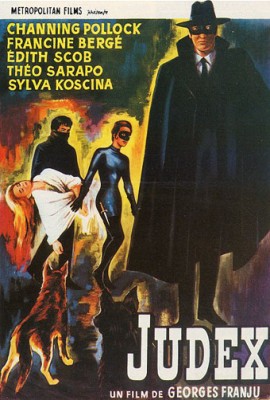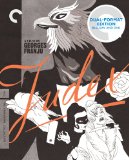| Reviews & Columns |
|
Reviews DVD TV on DVD Blu-ray 4K UHD International DVDs In Theaters Reviews by Studio Video Games Features Collector Series DVDs Easter Egg Database Interviews DVD Talk Radio Feature Articles Columns Anime Talk DVD Savant Horror DVDs The M.O.D. Squad Art House HD Talk Silent DVD
|
DVD Talk Forum |
|
|
| Resources |
|
DVD Price Search Customer Service #'s RCE Info Links |
|
Columns
|
|
|
Judex (Criterion Collection)
This French-Italian co-production clearly was influenced by the success of similar West German films, notably Fritz Lang's remake of The Thousand Eyes of Dr. Mabuse (Die 1000 Augen des Dr. Mabuse, 1960) and the follow-ups not directed by Lang, as well as Rialto's Edgar Wallace movies, beginning in 1959 with The Fellowship of the Frog (Der Frosch mit der Maske). Like Judex, Lang's Mabuse and Wallace's crime stories date back to the silent era. Franju originally had little interest in Judex; he wanted to remake yet another silent era crime story staple, the still-famous Fantômas, featured in at least five silent French serials. But Franju couldn't get the rights, and so accepted an offer from the grandson of Judex's creator, Louis Feuillade (who also directed the silent Fantômas), to remake that instead. (However, possibly due in part to Franju's film, a Fantômas trilogy directed by André Hunebelle and starring Jean Marais debuted the following year. I sure wish somebody would release English-subtitled editions of those, too!)
Criterion's Blu-ray (dual-formatted with an identical DVD version) offers a pristine presentation of the black-and-white, 1.66:1 widescreen production along with many fine extra features.
The film is packed with surprises, so rather than giving anything away this review will describe only the premise and avoid spoilers as much as possible. In France about 1920, wealthy banker Favraux (Michel Vitold) is preparing to celebrate his bank's 20th anniversary and the (unhappy) engagement of his daughter, Jacqueline (ethereal Édith Scob) to an aristocrat. He's also propositioning his granddaughter's governess, Marie Verdier (Francine Bergé), to marry him.
However, Favraux receives a threatening letter from a mysterious figure named Judex, demanding Farvraux turn over half his fortune to "his victims," people whose lives had had ruined years before during the Panama Scandal, when the then-stockbroker's clerk got his hands on some incriminating documents. Despite the misgivings of Favraux's longtime assistant, elderly Vallieres (Channing Pollock), Favraux dismisses Judex's threats to murder him at midnight the following evening as the work of a crank, possibly a disgruntled employee.
The next evening Favraux hosts a large costume party, with all the guests wearing bird masks. (This sequence and the masks they wear are based on the work of caricaturist J.J. Grandville.) At the party a tall figure, clearly Judex, appears, wearing the mask of an eagle (or is it a hawk?) and cradling an apparently dead dove in one hand, which he brings to life in a series of sleight-of-hand magic tricks. In a classic bit of magician's misdirection, he hands Favraux a glass of champagne just as the clock strikes midnight, but instead of sipping what the movie audiences anticipates to be poison, before the glass even touches his lips Favraux suddenly drops dead. (How Judex accomplishes this goes unexplained. Franju is unconcerned with several such details in the film's plotting.)
(Mild Spoilers) From this point, 20 minutes into the film, Judex becomes increasingly bizarre, in a labyrinthine plot involving multiple kidnappings and murders, a chateau-invasion robbery, revival of the dead, video monitoring predating the invention of television (thus making Judex technically science fiction), circus performers, and a masked, dagger-carrying villainess in black leotards who resembles Emma Peel.
Judex (pronounced "JEW-dex," with a soft "J") is a dizzying blend of poetic images, like Eyes Without a Face, combined with silent era pulp. From the standpoint of the American viewer unfamiliar with these Continental silent movie serials and their literary origins, one can easily see their subsequent influence on later American comic strips and Hollywood serials. Judex and his men wear slouched black hats, matching ski masks and capes, working out of the kind of lair that was the stock-and-trade of every Republic Pictures serial villain. In that lair Judex monitors his prisoners with an ornate video device that closely resembles one used by Ming the Merciless in the Flash Gordon serials of the 1930s. Could the makers of Flash Gordon have been inspired by the silent Judex, or did Franju remember this (or Alex Raymond's comic strip)?
Franju's goal, "to make the improbable realistic" largely succeeds. The evil Diana might look faintly ridiculous in her rooftop fight with circus aerialist Daisy (guest star Sylvia Koscina), who pops up near the end, but by this point in the film Franju has manifested the same level of giddy excitement as the films that inspired it. There's much dream-like, Eyes Without a Face imagery as well, accentuated by the film's private eye, Cocantin (Jacques Jouanneau) reading passages of Alice in Wonderland to Jacqueline's daughter.
The performances, Bergé especially but also Pollock and Scob, commit fully to the material, playing it straight precisely as Franju's adaptation demands. Indeed, once seen Bergé's performance ranks among the screen's greatest villainesses.
Maurice Jarre wrote the score, one that's both nostalgic and wistful for a type of cinema lost since past, but also exciting, modern, and appropriately strange.
Video & Audio
In its original 1.66:1 widescreen format, the black-and-white Judex looks nearly perfect. The image is notably sharp with strong blacks, and culled from the original 35mm camera negative. The mono French audio, from the 35mm soundtrack negative, is equally impressive and the English subtitles are excellent. The disc is region "A" encoded, while the DVD copy if Region 1.
Extra Features
Supplements include "Franju le visionnaire," a 50-minute episode from a French cinema history television series (its opening montage includes myriad famous directors including, yes, Jerry Lewis). The program is excellent but probably should have been preceded with a warning: early scenes feature indescribably disturbing slaughterhouse footage from Franju's first documentary short, The Blood of Beasts, including a live calf being decapitated.
Also included are recent interviews with actress Bergé, who modestly dismisses her own performance but has interesting things to say about her fellow cast members and Franju; and co-producer/co-writer Jacques Champreux, Louis Feuillade's grandson, who offers much behind-the-scenes anecdotes about the film's inception and production.
Two earlier Franju short documentaries are on the disc, too: Hôtel des Invalides (1951), an antiwar film narrated by Michel Simon; and Le Grand Méliès (1952), featuring Jeanne D'Alcy (Méliès's widow) and in recreations from Méliès's life, his look-alike grandson playing his grandfather.
Finally, there's a 36-page booklet featuring an essay by author Geoffrey O'Brien, and a commentary on Judex by Franju himself.
Parting Thoughts
A marvelously entertaining film as good or better than Eyes Without a Face, Judex will be a real find for those seeing it for the first time, a release that, hopefully, will prompt both North American distribution of Franju's other films as well as similarly nostalgic French and West German genre films made immediately before and after its release. A DVD Talk Collector Series title.
Stuart Galbraith IV is the Kyoto-based film historian and publisher-editor of World Cinema Paradise. His credits include film history books, DVD and Blu-ray audio commentaries and special features.
|
| Popular Reviews |
| Sponsored Links |
|
|
| Sponsored Links |
|
|
| Release List | Reviews | Shop | Newsletter | Forum | DVD Giveaways | Blu-Ray | Advertise |
|
Copyright 2024 DVDTalk.com All Rights Reserved. Legal Info, Privacy Policy, Terms of Use,
Manage Preferences,
Your Privacy Choices | |||||||












